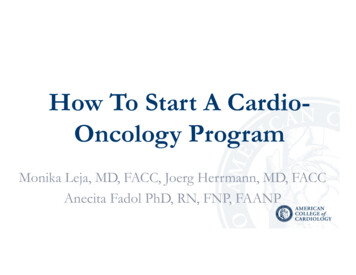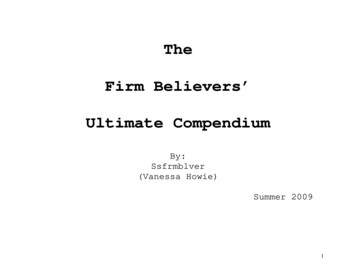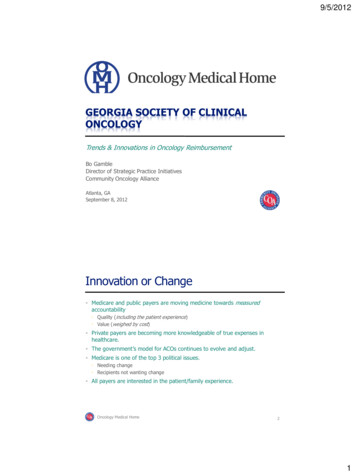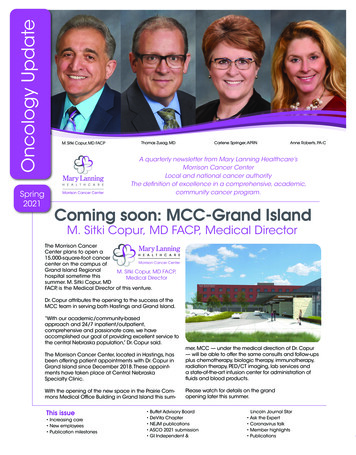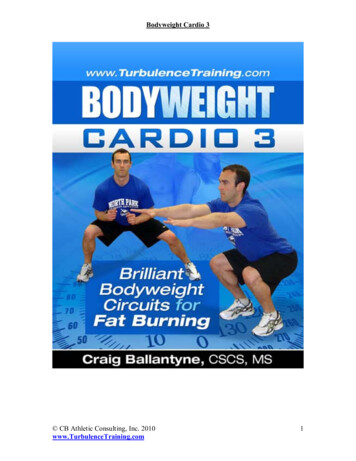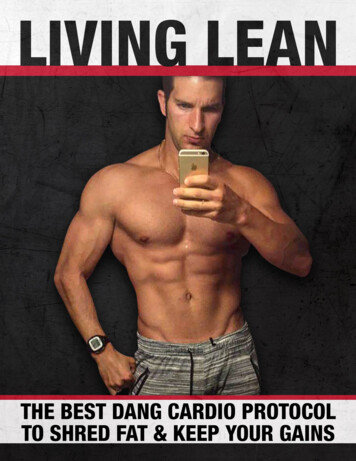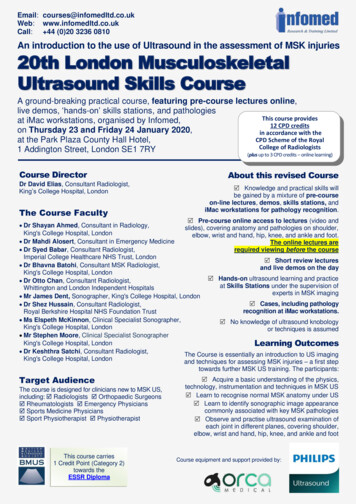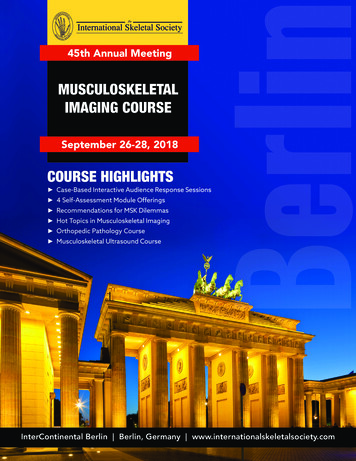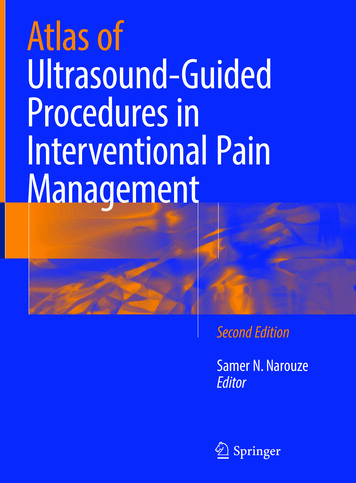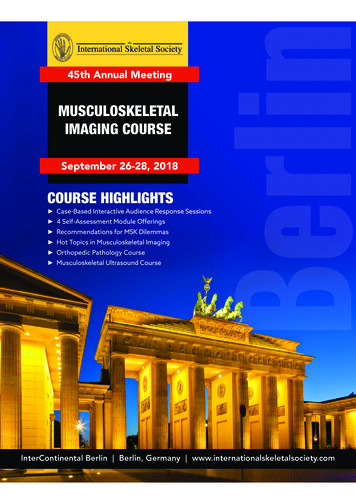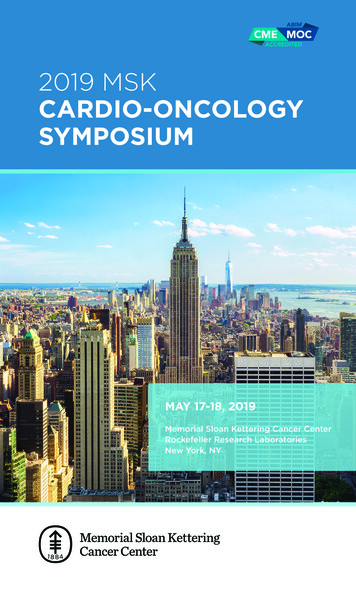
Transcription
2019 MSKCARDIO-ONCOLOGYSYMPOSIUMMAY 17-18, 2019Memorial Sloan Kettering Cancer CenterRockefeller Research LaboratoriesNew York, NY
OVERVIEWECHOCARDIOGRAPHY LEARNING LABCardio-oncology is a burgeoning field that has great importance asnewly developed cancer treatment improve cancer survival. Withnovel treatments come new or unexpected cardiovascular toxicitiesas many cancer survivors are now living enough to experience thepotential cardiotoxic effects of these treatments.There will be a seperate (optional) computer-based session whichwill provide participants a personalized hands-on experience inGlobal Longitudinal Strain (GLS) performance and analysis.The purpose of this conference is to provide a state-of-the-art,comprehensive, case-based curriculum that addresses importantclinical topics relevant to the cardiovascular health of patientswith cancer. Clinical experts from Memorial Sloan Kettering CancerCenter and around the country will present an up-to-date overviewon cutting edge cancer therapies and best practice strategies inthe evaluation and management of heart disease in cancer patientsfrom early diagnosis, treatment and long-term surveillance. Allpresentations will include devoted time to permit interactionbetween audience members and presenters.This course is intended for cardiologists, internists, hematologists/oncologists and other affiliated healthcare professionals who areinvolved in the care of cancer patients or have a special interest inthis area.Learning Objectives Describe the cardiotoxic regimens used in cancertreatment including novel targeted therapies Identify patients at high cardiovascular risk prior toplanned oncologic treatment Construct cardioprotective strategies prior, during andafter cancer therapy Explain the principles of surveillance and the incorporationof current guidelines on cardiotoxicity monitoring intoclinical practice. Describe primary and secondary prevention of cardiotoxicity Explain the appropriate use of non-invasive imagingmodalities for cardiotoxicity monitoring; the strengths andweaknesses of each modality including echocardiography,MUGA, CMR and CTA. State the late cardiovascular sequelae of cancerand its treatment Describe the importance of the multi-disciplinarycardio-oncology teamThe aim of the learning lab is to provide participants personalizedhands-on experience in GLS performance and analysis. Followingan introductory lecture on the clinical application of strain,participants will analyze real cases pre-loaded on their owncomputer workstation under the supervision of the faculty. Astep-by-step how to perform and analyze 2D GLS will bedemonstrated. Tips on acquiring optimal 2D images for speckletracking and how to measure GLS accurately will be discussed withexamples of common pitfalls to avoid.Space is limited to allow each participant sufficient opportunity tointeract with faculty; we encourage early registration. Please notethat if you register for the 2019 MSK Cardio-Oncology Symposium,you will receive a 50 discount code and a link to register for theworkshop in your email confirmation.AccreditationMemorial Sloan Kettering Cancer Center is accredited by theAccreditation Council for Continuing Medical Education toprovide continuing medical education for physicians.AMA Credit Designation StatementMemorial Sloan Kettering Cancer Center designates this live activityfor a maximum of 16.50 AMA PRA Category 1 Credits . Physicians should claimonly the credit commensurate with the extent of their participation in the activity.ABIM MOC Recognition StatementSuccessful completion of this CME activity, which includes participation in theevaluation component, enables the participant to earn up to 16.50 MedicalKnowledge MOC points in the American Board of Internal Medicine’s (ABIM)Maintenance of Certification (MOC) program. Participants will earn MOC pointsequivalent to the amount of CME credits claimed for the activity. It is the CMEactivity provider’s responsibility to submit participant completion informationto ACCME for the purpose of granting ABIM MOC credit.Faculty DisclosureIt is the policy of MSK to make every effort to insure balance, independence,objectivity, and scientific rigor in all continuing medical education activitieswhich it provides as an ACCME accredited provider. In accordance with ACCMEguidelines and standards, all faculty participating in an activity provided by MSKare expected to disclose any significant financial interest or other relationshipwith the manufacturer(s) of any commercial product(s) and/or provider(s)of commercial services which are discussed by the faculty members in aneducational presentation. As required by the ACCME, when an unlabeled useof a commercial product or an investigational use not yet approved for anypurpose is discussed during an educational activity, MSK requires the speakerto disclose that the product is not labeled for the use under discussion orthat the product is still investigational.
MSK COURSE DIRECTORSCOURSE FACULTYJennifer Liu, MDDirector, Cardiovascular LaboratoriesAttending PhysicianMemorial Sloan Kettering Cancer CenterAssociate Professor of MedicineWeill Cornell Medical CollegeRichard M. Steingart, MDChief, Cardiology ServiceAttending Physician,Memorial Sloan Kettering Cancer CenterProfessor of Medicine,Weill Cornell Medical CollegeMSK Course FacultyOren Cahlon, MDRadiation OncologyAngel Chan, MD, PhDCardiology ServiceCarol Chen, MDCardiology ServiceChau Dang, MDBreast Oncology ServiceSergio A. Giralt, MDSymposium Highlights Visit mskcc.org/Cardio-Oncfor more information.Clonal Hematopoesis of IndeterminatePotential (CHIP): A New Cardiovascular Risk Factor? Breast cancer treatment: Contemporary best practice strategies incancer treatment, cardiotoxicity monitoring and management. Immunotherapy: Understanding cutting edge check-point inhibitor andCAR-T cell therapy with a detailed discussion of their cardiovascular effects Novel oncologic therapy and emerging cardiotoxicity: Recognizing thepotential cardiac effects of new targeted therapy Cardiac amyloidosis: Contemporary approach to diagnosis andadvances in treatment. Radiation-Induced Heart Disease: Understanding the practice change overtime; monitoring and management of CV side effects. Cardiovascular risk assessment: Primary and secondary cardiovascular riskreduction during and after cancer therapy.Cardiac Imaging: Which modality, how often and which patient?Optional hands-on workshop on GLS measurement by 2D STE.Vascular complications: Toxicity related to cancer treatment.Management of arterial and venous thromboembolism in cancer.Clinical Challenges: 5FU induced chest painCardiovascular considerations in bone marrow transplantAtrial fibrillation and anticoagulationSurgical clearancePharmacologic, surgical and interventional cardiac approachesto acute coronary syndromes, valvular disease and arrhythmiasStroke in cancer patients Survivorship: Diagnosis, prevention and management of CV diseasein cancer survivors Establishing a cardio-oncology program: Identifying the stakeholders How to Code and Bill for Cardio-OncologyBone Marrow Transplant ServiceMyeloma ServiceKatherine Lee-Chuy MDCardiology ServiceElena Mead, MDCritical Care Medicine ServiceMichael Postow, MDMelanoma ServiceBone Marrow Transplant ServiceMyeloma ServiceWendy Schaffer, MD, PhDDipti Gupta, MD, MPHGerald Soff, MDBhisham Harchandani, MDEmily S. Tonorezos, MD, MPHMichelle Johnson, MD, MPHAnthony Yu, MDCardiology ServiceLive Simulcast Available!Heather J. Landau, MDCardiology ServiceCardiology ServiceCardiology ServiceBenign Hematology ServiceGeneral Internal Medicine ServiceCardiology ServiceInvited Course FacultyGregory Armstrong, MD, MSCEDaniel Lenihan, MDAnita Arnold, DO, MBASteven E. Lipshultz, MD, FAAP, FAHASt. Jude Children’s Research HospitalLee Physician GroupAna Barac, MD, PhDMedStar Washington Hospital CenterUsman Baber, MDMt. Sinai HospitalJim Cheung, MDWeill Cornell Medical CenterMarielle Scherrer Crosbie, MD, PhDPerelman School of MedicineUniversity of PennsylvaniaSusan Dent, MDDuke UniversityMichael Fradley, MDUniversity of South FloridaJoerg Herrmann, MDMayo Clinic, Rochester NYBonnie Ky, MD, MSCEPerelman School of MedicineUniversity of PennsylvaniaWashington UniversityUniversity at Buffalo Jacobs School ofMedicine and Biomedical SciencesJohn R. Oishei Children’s HospitalBruce Lytle, MDThe Heart Hospital Baylor PlanoPeter Libby, MDBrigham and Women’s HospitalSyed Mahmood, MDWeill Cornell Medical CenterJavid Moslehi, MDVanderbilt University Medical CenterBabek Navi, MDWeill Cornell Medical CenterVera Potievskaya, MD, PhDNational Medical Research Radiology CenterAlex Reyentovich, MDNYU Langone HealthJonathan Weinsaft, MDWeill Cornell Medical Center
SYMPOSIUM SCHEDULE12:35 pmLunchOptional Lunch Symposium (Board Room)Friday, May 17, 20197:00 am8:15 am1:35 pmAlex Reyentovich, MD1:55 pmFrom Bench to BedsideClonal Hematopoiesis of Indeterminate Potential (CHIP):A New Risk Factor of Cardiovascular Disease?2:15 pmQ&A2:30 pmBreakKeynote LectureCardio-Oncology – Past, Present and FutureQ&ACardio-Oncology Clinical Practice Guidelines:Key Take Home MessagesAna Barac, MD, PhDBreast Cancer:9:30 amContemporary Breast Cancer Therapy –Anthracyclines, HER2 targeted therapyand Other TreatmentsChau Dang, MD9:50 amCardiotoxicity Associated with Breast Cancer Treatment:Risk Prediction and Preventative StrategiesAnthony Yu, MD10:10 amManaging CV issues During and After BreastCancer Treatment – Case ReviewMichelle Johnson, MD, MPH10:25 amQ&A10:40 amBreakImmunotherapy:11:00 amSESSION IIVascular Complications in Patients with Cancer2:40 pm11:20 amCAR T-cell Therapy: What, How, For Whom?Understanding the Potential ToxicitiesElena Mead , MD11:40 amImmunotherapy Associated Myocarditis –Detection and Treatment Strategies3:00 pm12:15 pmCase ReviewVSPI and Adverse Cardiovascular Effects –HTN, LV Dysfunction and ThromboembolismDaniel Lenihan, MD3:20 pmChemotherapeutic Agents Associated Coronary IschemiaWendy Schaffer, MD PhD3:40 pmCardiovascular Effects of Androgen DeprivationTherapy in Prostate Cancer PatientsDipti Gupta, MD, MPH4:00 pmQ&A4:20 pmBreakSESSION IIICancer Survivorship4:35 pmLate Onset Cardiotoxicity in Adult Survivors ofChildhood Cancer: Incidence, Risk Factors andIndividual CV Risk PredictionGregory Armstrong, MD, MSCE4:55 pmHow to Mitigate Cardiotoxicity – Role of Exercise, Statinand Cardioprotective Agents. Lessons Learned fromSurvivors of Childhood CancerSteven E. Lipshultz, MD, FAAP, FAHA5:15 pmCancer Survivorship Clinic: Essential Components of CareEmily S. Tonorezos, MD, MPH5:35 pmQ&A5:55 pmSpecial LectureThe QT Interval Conundrum in Patients with Cancer –How to and Why Measure QT Interval?Javid Moslehi, MD12:00 pmVenous Thromboembolism in Cancer Patients:Prevention and TreatmentGerald Soff, MDImmunotherapy: Understanding Antitumor Immunityand Moving the Field ForwardMichael Postow, MDTreatment of Multiple Myeloma – Cardiac Safety withProteasome and Immunomodulatory DrugsDaniel Lenihan, MDSESSION IBest Practice Strategies to Optimize Outcomes9:10 amEmerging Treatments for TTR Cardiac AmyloidRichard M. Steingart, MDSusan Dent, MD9:00 amContemporary Management of AL amyloidosisHeather J. Landau, MDOpening RemarksPeter Libby, MD8:40 amCardiac Amyloidosis:Epidemiology, Presentation, DiagnosisJennifer Liu, MD1:15 pmWelcome & IntroductionJennifer Liu, MD8:05 am12:55 pmRegistration & BreakfastDepartment of Medicine Grand Rounds8:00 amAmyloidosis and Multiple MyelomaContemporary Diagnosis and New Advances in TreatmentMichael Fradley, MDCarol Chen, MD6:15 pmQ&AQ&A6:20 pmAdjourn
SYMPOSIUM SCHEDULESESSION VIIRadiation and the HeartMODERATOR Vera Potievskaya, MD, PhDSaturday, May 18, 2019Breakfast7:50 amOpening Remarks/Day 1 Review2:00 pmKeynote LectureMy Vision for the Future of JACC:CardioOncology as the Editor-in-chief2:20 pmSESSION IVImaging in Cardio-Oncology/Preclinical Markers of CardiotoxicityMODERATOR Angel Chan, MD, PhD8:20 amMarielle Scherrer Crosbie, MD, PhD9:00 am2:40 pm9:20 amQ&ASESSION VCardiovascular Considerations in Hematologic Malignancies9:40 am10:20 amCommon CV Issues Encountered duringBone Marrow TransplantSyed Mahmood, MDKatherine Lee-Chuy, MDBhisham Harchandani, MD3:40 pmEXPERT PANELSusan Dent, MDJoerg Herrmann, MDRichard M. Steingart, MDSpecial LectureHow to Code and Bill for Cardio OncologyAnita Arnold, DO, MBA4:00 pmQ&A4:05 pmClosing Remarks and AdjournComputer Based Hands-On Learning Lab (Optional)Wendy Schaffer, MD PhDHow to Perform and Analyze Global LongitudinalStrain (GLS) - Tips and TricksTKI Associated CV Toxicity in CML4:15 pm- 6:15 pmJoerg Herrmann, MD10:40 amQ&A11:00 amBreakSESSION VICardiovascular Challenges in Cancer Patients11:20 amCarol Chen, MDUnderstanding Stem Cell/Bone Marrow TransplantSergio A. Giralt, MD10:00 amMODERATORPRESENTERSMultimodality Imaging of Cardiac MassesJonathan Weinsaft, MDQ&ASESSION VIIIChallenging Real-World Cases – Discussion with the ExpertsRole of Echo in Clinical Decision Making for PatientsDuring and After Cancer TherapyIs 2D Echo LVEF Enough? The Role of Serum Biomarker,Strain Imaging, 3D Echo and Cardiac MRICardiac Surgery in Patients with RadiationAssociated Heart DiseaseBruce Lytle, MDJennifer Liu, MD8:40 amCardiovascular Complications of RadiationRichard M. Steingart, MDJennifer Liu, MDRichard M. Steingart, MDBonnie Ky, MD, MSCERadiation Therapy. Strategies to Minimize RadiationInduced Cardiotoxicity - Past, Present and FutureOren Cahlon, MD1:40 pm7:30 am8:00 am1:20 pmCLINICAL CONUNDRUMSMedical and Interventional Management ofAcute and Chronic CADUsman Baber, MDAF and Anticoagulation – Does the CHADS Score ApplyJim Cheung, MDStroke in Patients with CancerLEARNING OBJECTIVES State the methodology behind speckletracking and the utility of GLS inclinical practice. Demonstrate how to acquire 2D imagesfor GLS measurement Perform GLS analysis and discusscommon pitfalls to avoid.Space is limited and we do encourage early registration.Please note that if you register for the 2019 MSK Cardio-OncologySymposium, you will receive a 50 discount code and a link to registerfor the workshop in your email confirmation.Babek Navi, MD12:20 pmQ&A12:40 pmLunchLive Simulcast Available!Visit mskcc.org/Cardio-Onc for more information.mskcc.org/Cardio-Onc
REGISTRATIONREGISTRATION FEESEARLY*GENERAL 425 525Residents, Fellows, Nurses andOther Healthcare Providers 250 350Industry Professionals** 825 925Learning Lab (seperate registration required) 175 175Physicians (MDs, PhDs and DOs)*Early Registration expires March 17, 2019**Industry professionals may attend MSK CME activities for their own education.Marketing, sales, and promotion of products and services is strictly prohibited atMSK CME activities.Register Online:mskcc.org/Cardio-OncCourse registration includes continental breakfast, lunch, and refreshmentbreaks. Please contact cme@mskcc.org at least one week prior to thecourse if you have any special dietary requests or require any specificaccommodations.If you register for the 2019 MSK Cardio-Oncology Symposium,you will receive a 50 discount code for this workshop in youremail confirmation. Please complete registration for the 2019Cardio-Oncology Symposium first and then register for theLearning Lab. Please note there is a waitlist for MSK employees.MSK CME offers a 30% discounted rate for MSK Alumni, MSKCancer Alliance and Cancer Care Partners. If you are a memberof one of these groups, please contact cme@mskcc.org for moreinformation.MSK employee registration is complimentary. However, you mustcomplete course registration in order to attend this course.Conference LocationRockefeller Research Laboratories430 East 67th StreetNew York, NY 10065AccommodationsMSK has negotiated special rates and amenities at select hotels inManhattan. For information on hotels in the vicinity of MSK with discountedrates, please visit: mskcc.org/cme.ContactMemorial Sloan Kettering Cancer CenterOffice of Continuing Medical Educationmskcc.org/cmecme@mskcc.org
12:00 pm Case Review Carol Chen, MD 12:15 pm Q&A 12:35 pm Lunch Optional Lunch Symposium (Board Room) Amyloidosis and Multiple Myeloma Contemporary Diagnosis and New Advances in Treatment 12:55 pm Cardiac Amyloidosis: Epidemiology, Presentation, Diagnosis Jennifer Liu, MD 1:15 pm Contemporary Management of AL amyloidosis Heather J. Landau, MD
